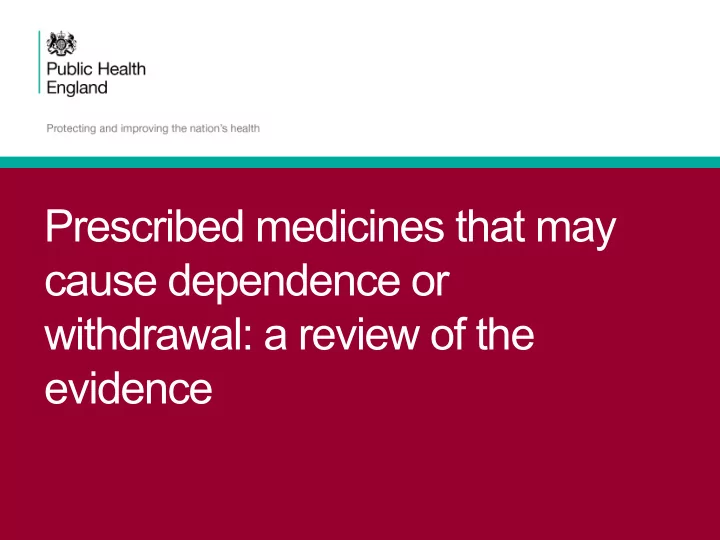

Prescribed medicines that may cause dependence or withdrawal: a review of the evidence
Background to the review • Oct 2017, PHE commissioned by Minister for Public Health & Primary Care to undertake review • Previous to this, DH/NTA/PHE programmes of work to research issue and improve education, labelling, commissioning, etc • Most recently DH commissioned NatCen to research prescribing patterns in dependence forming medicines • Guidance already exists, including NICE guidelines (antidepressants being updated) and Clinical Knowledge Summaries, British National Formulary, drug dependence clinical guidelines, earlier CSM/CMO • Dependence on prescribed drugs is included in Drug Strategy 2017. • Since the commission PHE has been engaging government stakeholders; scoping the data and information governance issues; and developing the methodology. 2 Prescribed medicines that may cause dependence or withdrawal: a review of the evidence
Aim • To deliver a broad, public-health focused review of commonly prescribed medicines, authorised for adults who have non-cancer pain, anxiety, insomnia or depression. The review will bring together the best available evidence on: o prevalence and prescribing o the nature and likely causes of dependence or withdrawal among some people who continue to take these medicines o effective prevention and treatment responses for each indication 3 Prescribed medicines that may cause dependence or withdrawal: a review of the evidence
Scope • In scope o Adults (age 18 & over) o Dependence and withdrawal/discontinuation syndrome o Benzodiazepines, z-drugs, GABA-ergic medicines, opioid pain medications, antidepressants o Medicines above that are prescribed in the treatment of anxiety, insomnia, chronic non-cancer pain and depression o Prescribing in the community • Out of scope : cancer/terminal pain, OTC medicines, prescribing in hospitals or prisons, anti-psychotics, stimulants, ‘smart drugs’, anti- obesity meds 4 Prescribed medicines that may cause dependence or withdrawal: a review of the evidence
Methods • Independent mapping of drug categories, conditions and guidance. To inform scoping, data analysis and literature review. • Data analysis. Collaborative approach to analyse all prescription and some GP patient data to understand prevalence and detail of prescribing patterns, patients, conditions, etc. • Stakeholder expert group. To inform approach, interpret findings and propose recommendations. • Broader stakeholder engagement. To ensure relevance, appropriateness and support. • Call for papers/evidence. Unpublished research, grey literature (third sector reports, etc), reports collating personal experiences. • Literature review. Summarising the evidence on causes, harms and effective responses (prevention and treatment). • Report. The evidence review and recommendations, peer reviewed, published in January 2019. 5 Prescribed medicines that may cause dependence or withdrawal: a review of the evidence
Recommend
More recommend